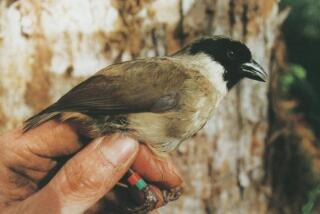Norton Lifts Endangered Status for Aleutian Canada Goose
- Share via
The Aleutian Canada goose, near extinction 30 years ago, is doing well enough to be taken off the endangered species list, federal officials announced this week.
The geese, which winter in the San Joaquin Valley, were nearly wiped out by foxes introduced to the remote Aleutian islands on which they nest.
One of the first species protected under the federal Endangered Species Act of 1973, Aleutians numbered in the hundreds a quarter-century ago. The population had grown to 6,300 birds by 1990 and is approaching 40,000.
“I’m pleased to say after three decades of effort we now have 37,000 geese,” Interior Secretary Gale Norton said Monday in announcing that the bird would be removed from the list of threatened and endangered species.
It will continue to be protected under the Migratory Bird Treaty Act. A federal wildlife biologist said there are no immediate plans to permit hunting of the Aleutians.
The geese had no mammal predator on the wind-swept Alaskan islands on which they bred until nonnative foxes were introduced by trappers in the mid-1700s. The fox introductions peaked in the first half of the last century, when fox furs were especially popular.
Starting in 1938, there were no recorded sightings of the bird for more than two decades, until a remnant population was found in 1962 on a rugged island in the western Aleutians.
Under the recovery program, biologists killed off the predatory foxes and either bought or protected thousands of acres of the Aleutians’ wintering ground in California’s central valley.
More to Read
Sign up for Essential California
The most important California stories and recommendations in your inbox every morning.
You may occasionally receive promotional content from the Los Angeles Times.














